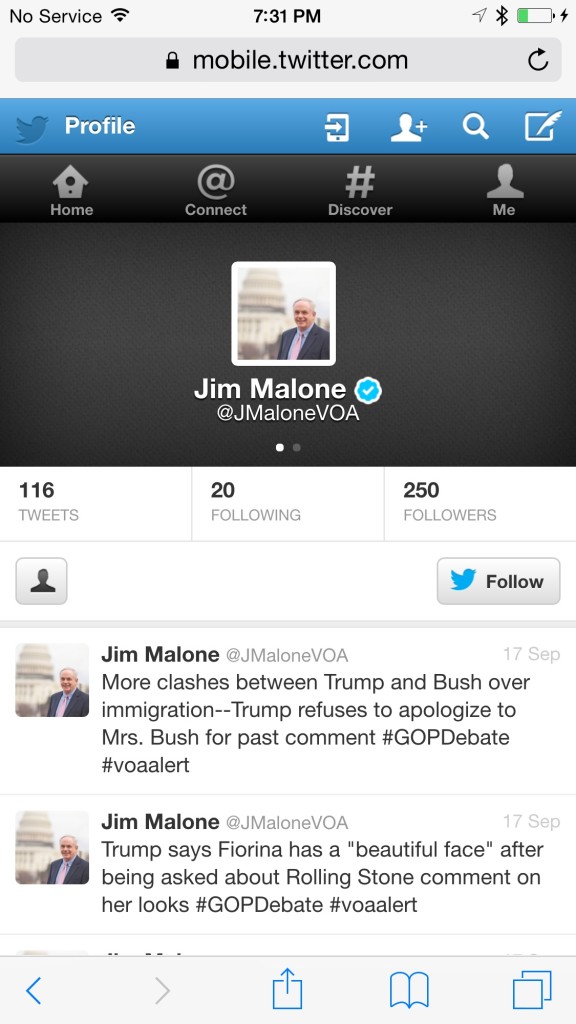BBG Watch Commentary
Voice of America Reporter Jim Malone Against VOA Journalists Countering Violent Extremism
[Click HERE to see video.]
Senior Voice of America (VOA) correspondents (VOA Central English News) are U.S. Government salaried employees. They are expected to provide important context and news analysis for radio, TV and Internet audiences abroad. VOA video below from this year’s VOA coverage of World War II anniversary observances in Washingtion, DC is one example of how they perform. With one or two exceptions, many VOA English News foreign correspondents and domestic reporters have hardly any social media following abroad.
Voice of America as a news organization is not doing any better in its English language news coverage, social media outreach and audience engagement. It has been mismanaged for years. Its bureaucracy has grown tremendously while VOA programs have shrunk and journalists lack resources to do their job properly.
VOA English News Twitter account has four times fewer followers than the new Twitter account of Edward Snowden who has 1.3 million. BBC News has over 18 million Twitter followers; VOA English News about 299,700. Russia’s RT Twitter account has 1.2 million followers. Many of VOA’s language services are not doing much better in terms of online audience engagement even in countries not practicing Internet censorship. VOA Russian Service Twitter account has about 187,800 Twitter followers. VOA Russian Service Facebook account has only 53,000 “Likes.”
Many senior VOA English News correspondents get very few “Likes” for their reports posted on the Voice of America website and get practically no comments from readers in contrast to BBC or RT.
That’s why the controversy over VOA and Broadcasting Board of Governors (BBG) allegedly pushing VOA reporters to engage in “messaging” and “countering” hostile propaganda seems like an artificially created issue. It distracts from VOA’s real management problems and lack of traction with English-speaking international audiences.
The Voice of America was established during World War II to counter Nazi and Japanese propaganda. It also countered Soviet propaganda during the Cold War without violating its 1976 VOA Charter. Under this law, VOA is required to present U.S. policies.
One former Voice of America staffer had this comment after reading the statement made to the Broadcasting Board of Governors by VOA senior correspondent Jim Malone:
“Reading this convinces me he is in dreamland.
The place would not even EXIST were it not for the broader objectives at the moment of helping to support policy objectives, regardless of the journalism component.”
The Voice of America is 100 percent funded by U.S. taxpayers. VOA’s annual budget is about $200 million. The agency’s budget is about $740 million. U. S. taxpayers and lawmakers who approve this funding expect that for this kind of money VOA would have some influence on foreign audiences and serve U.S. national interests. They don’t want VOA to spread false propaganda, but they want it to be effective as a source of news that indeed corrects and counters false propaganda and disinformation spread by others.
Some senior VOA correspondents are paid more than $150,000 per year in salaries in addition to other federal government employment benefits. The large ranks of VOA and agency executives are also composed of well-paid government employees. Many other VOA broadcasters, however, are poorly-paid full-time employee contractors without any basic employment benefits or employment rights protections. This is especially true in VOA foreign language services.
There seems little danger of VOA becoming a U.S. Government’s tool of spreading false propaganda. Most long-term VOA journalists, especially in VOA’s foreign language services, seem eager to counter lies and falsehoods without worrying whether this might be viewed as propaganda. They see it as what good journalists are expected to do. Countering violent extremism or Putin’s propaganda is not in their view contrary to good journalistic practice, just as exposing and countering government corruption in the United States would not bother any good American reporter. BBG’s non-federal entities, such as Radio Free Europe / Radio Liberty (RFE/RL) and Radio Free Asia (RFA), also do not believe that countering propaganda is in itself an exercise in propaganda. Some VOA English News correspondents, however, insist that the danger of VOA becoming a propaganda tool of the U.S. Government is real.
“WWII Victory Flyover Reaction” – VOA Correspondents Jim Malone and Andre Denesnera comment on the WW II Victory Flyover on the National Mall, May 8, 2015.
Jim Malone is a senior VOA English correspondent who spoke at the October 8, 2015 BBG meeting. A list of his recent reports can be seen here. Viewed in full desktop format, some of them show their Facebook and Twitter stats, as well as the number of readers’ comments. He has been with VOA since 1983. As of October 12, his Twitter account is showing 250 followers.
JIM MALONE REMARKS AT THE U.S. BROADCASTING BOARD OF GOVERNORS
(As prepared for delivery. Please check the video.)
October 8, 2015
Chairman Shell, members of the Board of Governors, CEO Lansing, ladies and gentlemen:
Good morning. My name is Jim Malone. I am a correspondent in the VOA Central Newsroom and have worked at VOA since 1983.
I’m here on behalf of many of my colleagues at VOA who are concerned about our journalistic credibility in connection with the intense focus on the policy initiative known as Countering Violent Extremism, or C-V-E.
Let me be clear. As a policy goal, I know of no one who would argue with the notion of countering violent extremism. But the growing focus on and funding of the initiative within VOA and the apparent desire to involve journalists in pursuit of a policy goal casts doubt on our independence and our journalistic integrity.
In July, senior VOA managers attended a policy retreat focused on “countering violent extremism.” Among the topics: “not every side of a story deserves repeating” and “how broadcast services could approach opportunities to undermine extremism.” How does this conform to the VOA Charter, which is public law, and the VOA Journalistic Code, which says VOA journalists “do not speak for the U.S. government,” and the International Broadcasting Act that requires the BBG board to act as a “firewall” to protect the independence and integrity of VOA journalism?
We take all aspects of the VOA Charter seriously—to be a reliable source of credible news, to represent the diversity of American thought and opinion and to present government policies as well as responsible debate on those policies. In recent months, VOA Central News and the language services have done extensive reporting on the battle against the Islamic State, including many compelling reports from the front lines.
This news focus makes it all the more imperative to keep policy advocacy separate from VOA journalism. We take heart from comments this week from our new CEO, John Lansing, who says he is committed to VOA journalists carrying out their mission according to the VOA Charter, not to act as counter-propagandists.
It was Edward R. Murrow who once said: “To be persuasive we must be believable, to be believable we must be credible, to be credible we must be truthful.”
Murrow’s picture still hangs in the VOA Newsroom, a reminder to all that our mission was, is and should remain credible journalism. Thank you.
From and editorial in the Washington Post on 6-8-14:
“VOA distinguishes itself from state services like Russia Today by embodying the democratic values of independent media and open debate. The United States will never beat China and Russia in the game of official propaganda but it can win the war of ideas, if it doesn’t lose faith in its own principles.”
From an editorial in the New York Times on 5-25-14:
“It is critical that the sponsors guarantee the American public as much as the world that standards of professional journalism will not be sacrificed in favor of a simplistic propaganda megaphone.”
The VOA Charter, which is public law, requires VOA news to be accurate, objective and comprehensive, to represent a balanced and comprehensive representation of American thought and opinion, and to present U.S. policies along with responsible discussion and opinion on those policies. That last requirement has never meant that VOA journalists actively advocate policy in their reports and broadcasts.
Under a law passed by Congress in 1998, the BBG is to act as a “firewall” between VOA journalists and the State Department to “ensure the integrity of VOA journalism.”
And the VOA Journalistic Code says VOA reporters and broadcasters must strive for accuracy and objectivity in their work. “They do not speak for the U.S. government” and they are “careful to preserve the integrity of their organization, strive for excellence and avoid imbalance or bias in their broadcasts.”
###
At the same BBG board meeting, Adam Clayton Powell III said he was not responding to Jim Malone statement, but he did provide a countervailing view.
Adam Clayton Powell III Says Responding to Untrue Propaganda Not Inconsistent With Journalism
ADAM CLAYTON POWELL III REMARKS AT THE US BROADCASTING BOARD OF GOVERNORS
(As prepared for delivery. Please check the video.)
October 8, 2015
Mr. Chairman, Governors, Director Lansing. My name is Adam Clayton Powell III, and I am President of the Public Diplomacy Council and a Senior Fellow at the University of Southern California. But this morning I speak as an individual; the views are my own and not of those or any other institution.
We read of the debate about BBG mission, the debate about how to respond to untrue propaganda, and the debate about what is and isn’t permitted under the VOA charter.
As someone who spent decades at CBS News, NPR and other news organizations, it was always the highest calling of objective journalism to speak truth to power and to spotlight misdeeds wherever they may be. It is therefore the highest calling of objective journalism to draw attention to what is by any objective test illegal and to what is antithetical to the beliefs of women and men of free will.
These are not inconsistent in any way with objective journalism; quite the reverse:
To state the obvious, not everything is true; some things are provably false. Not everything is equivalent; some things are repulsive to humanity.
Today the choice can be very clear. Seizing neighboring countries’ territory by force is not just another ideology. Shooting down civilian airliners, whether a Korean Airlines 747 or Malaysian Airlines 777, is not just another point of view. Jailing political opponents in Havana or Caracas is not just an alternative lifestyle. Mass enslavement of women and girls by ISIS is not just another way of exercising power. Mass kidnapping of African boys and forcing them to become soldiers is not just another way to govern.
These are, by any objective standard, practices which civilized people everywhere can and do condemn. These are, by any objective standard, practices that the best journalism can and should expose, to its credit. These are, by any objective standard, what America opposes.
Your challenge and your opportunity is to state this clearly and forcefully, every day, every hour.
You are the communicators of freedom, in the same tradition that 70 years ago, articulated Freedom of Speech, Freedom of Worship, Freedom from Want, and Freedom from Fear, and in the same tradition that 240 years ago, inspired communicators of freedom to write, “We hold these truths to be self-evident.”
Democracy is not just another ideology.
And freedom is not just another point of view.
Thank you for your time.
###





